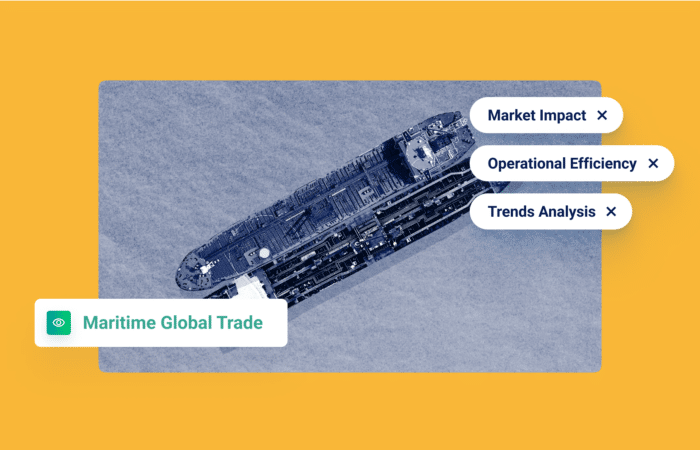Avoid maritime sanctions violations & remain compliant

What’s inside?
Sanctions are an essential foreign policy tool. They are imposed by governments and international bodies to deter bad behavior of state and non-state actors, and to force behavior change. For example, they are imposed in response to terrorism, nuclear proliferation, military conflicts, and other foreign policy crises. Sanctioned countries currently include Russia, Iran, North Korea, and Syria.
Within the maritime sphere, ships often travel internationally, enter and exit different ports, and are at risk of sanctions violations due to potentially prohibited cargo, trade with sanctioned organizations or countries, violation of maritime laws, etc. To ensure they stay compliant and avoid risk exposure, it is necessary to proactively utilize sanctions screening and to implement an overall sanctions compliance strategy.
What are economic sanctions?
According to the Council on Foreign Relations, “Economic sanctions are defined as the withdrawal of customary trade and financial relations for foreign- and security-policy purposes. Sanctions may be comprehensive, prohibiting commercial activity with regard to an entire country, like the long-standing U.S. embargo of Cuba, or they may be targeted, blocking transactions by and with particular businesses, groups, or individuals.”
In the U.S., sanctions regulations are administered by the Treasury Department’s Office of Foreign Assets Control (OFAC). “Economic sanctions are designed to deprive the target of the use of its assets and to deny it access to the U.S. financial system and the benefits of trade, transactions, and services involving U.S. markets, businesses, and individuals.”
All companies and individuals doing business in the U.S. are required by the U.S. Patriot Act to comply with OFAC regulations. “OFAC requires the blocking of accounts and property of specified countries, entities, and individuals. It also prohibits unlicensed trade and financial transactions with sanctioned countries, entities, and individuals.”
Sanctions violations and consequences
What are the penalties for violating OFAC regulations? If there is suspicion of sanctions violations, an OFAC investigation may lead to one or more of the following actions:
- No Action – if OFAC determines that there’s not enough evidence to conclude a sanctions violation has occurred.
- Request Additional Information – if OFAC determines that additional information is needed, it may request further information.
- Cautionary Letter – if OFAC determines that there is insufficient evidence to conclude that a sanctions violation has occurred, believes that the underlying conduct could lead to a sanctions violation in other circumstances and/or that a Subject Person does not appear to be exercising due diligence in ensuring compliance, OFAC may issue a cautionary letter.
- Finding of Violation – if OFAC determines that a sanctions violation has occurred and concludes that the Subject Person’s conduct warrants an administrative response, OFAC may issue a Finding of Violation that identifies the violation. A Finding of Violation may also convey OFAC’s concerns about the sanctions violation and/or the Subject Person’s OFAC compliance policies, practices and/or procedures, and/or identify the need for further compliance steps to be taken.
- Civil Monetary Penalty – if OFAC determines that a sanctions violation has occurred and concludes that the Subject Person’s conduct warrants the imposition of a monetary penalty, OFAC may impose a civil monetary penalty.
- Criminal Referral – OFAC may refer the matter to appropriate law enforcement agencies for criminal investigation and/or prosecution. Apparent sanctions violations that OFAC has referred for criminal investigation and/or prosecution may be subject to OFAC civil penalty, or other administrative action.

OFAC compliance checklist
To get started and understand the basics, this OFAC compliance checklist can guide organizations and individuals. If a transaction involves someone on the Specially Designated Nationals and Block Persons (SDN) list:
Determine if the individual is subject to OFAC action
✔ Call OFAC to verify that the hit is not a false positive
✔ Block the asset, or reject the transaction
✔ File a Suspicious Activity Report (SAR) within 10 business days to OFAC
✔ Being in control of who they do business with is an important foundation for organizations’ due diligence strategies. Implementing solutions, such as AI technology, can help.
A holistic strategy – easy ways to stay compliant
Having a 360° view of maritime risk ensures organizations have an overview of the maritime domain and deeply understand all vessel risk aspects to better protect themselves and their reputations. The right solution empowers organizations with immediate risk recommendations that are customized to meet their needs. A full vessel profile based on real-time behavior data and analysis, and an understanding of risk alerts with context, will help maritime entities easily identify bad actors that are using deceptive shipping practices. This will naturally lead to better, more strategic business decisions.

A comprehensive maritime compliance strategy results from a holistic approach. This means obtaining as much relevant information as possible to screen maritime and non-maritime companies and individuals to ensure sanctions compliance. As our Quick Guide for Maritime Due Diligence explains: “Understanding maritime compliance, and mitigating risk goes beyond the vessels and extends to the entire supply chain. Entities like factories, ports, refineries, mines, trucking companies, and the key employees of these organizations are often overlooked, but can significantly impact your risk exposure.”











